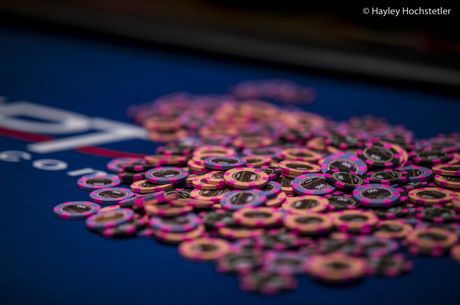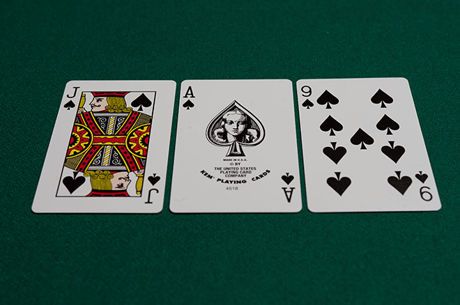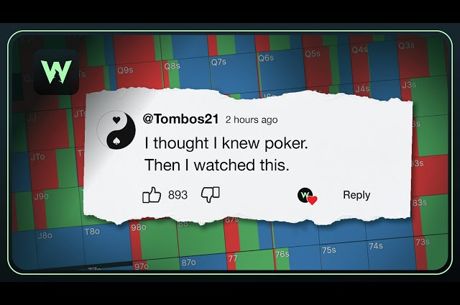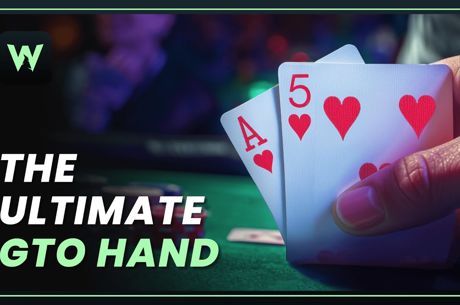Winning Strategies for Button Straddle Battles

A live straddle bet in poker is an extra, voluntary blind bet made by a player before cards are dealt. The straddle is "live" as that player gains the privilege of acting last in the preflop betting, with the option of raising if no one else has.
When players start posting straddles, be prepared to make a few adjustments to how you think about and play these hands.
Straddles Change the Stakes
Straddles raise the stakes and consequently shrink everyone's stack-to-pot ratio (SPR). Stop thinking of your stack as 150 big blinds; now you have 75 straddles.
Limping and raising become more expensive. Since the straddle is treated as a third blind bet, limping into the pot costs the straddle amount, making it harder to see a cheap flop. The minimum raise will be double that amount.
Many poker rooms only allow straddles from under the gun, for double the big blind (or $5 in a $1/$2 no-limit hold'em game). Others allow the button to straddle, or straddles in larger or unlimited amounts. The Mississippi Straddle rule used in many private games allows a straddle of any amount from any position.
The most vexing, however, is the button straddle. Let's focus our attention there. The button already has the significant advantage of acting last on each postflop betting round. By posting a straddle, he or she also acts last preflop and enjoys these advantages for higher effective stakes than in all non-straddle pots.
Some opponents will straddle every single time they have the button. Others may adjust by becoming copycats, also straddling on every button hoping that will counter the original straddler's advantage. You might discover that the $2/$5 game you joined has turned into a $2/$5/$10 game. Is that what you signed up for?
Make Profitable Adjustments Against Button Straddles
A debate about whether the advantage gained by raising the stakes in position exceeds the expected value lost by voluntarily putting extra chips in the pot before looking at your cards is beyond the scope of this article. Personally, I prefer not to straddle, instead saving my chips until I know whether my cards are worthy of an investment.
There are some profitable adjustments to make, however, against serial button straddlers. In each case, you must carefully observe how both the straddler and other players approach these hands. Straddles tend to exaggerate many players' core styles, making passive players more passive, loose players looser, and gamblers more gambly.
Against button straddlers who love to attack multiple limpers, consider limping with the strongest part of your range, even if several other players have already limped in. Of course, reraise when the action comes back around. You might never limp with K-K or Q-Q after multiple other limps in a non-straddle pot, but against a button straddler with a very high raising frequency, this becomes a way to print money.
Many of your opponents will defend their button straddles with a very wide and weak range, believing their positional advantage outweighs all other considerations. Consider moving to their immediate right if that seat is open. Being next-to-last preflop allows you to play a tight-aggressive style seeing everyone else's actions with a huge range advantage against the only player who can have favorable postflop position. Make larger raises than you would against an under-the-gun straddle, to charge the highest possible price when the button insists on defending.
Fold marginal strength hands. While this may be universally good advice, folding is even smarter against button straddles. Shift the weakest hands you like to play into your folding range. Remember that the straddle cuts your SPR in half, which reduces the implied odds that make these hands playable.
Raise! In a regular $2/$5 hand, if two players limp, you raise, and everyone folds, you win $17. If the same hand featured a $10 button straddle, you would win $37. Those sorts of pots can contribute well toward a solid hourly win rate for many successful $2/$5 players. The straddle makes the pot more worth fighting for. The best time to attack is when the straddle has pushed your opponents out of their comfort zones.
Check your stack size and pocket bankroll. If your stack has less than 100 big blinds, you can resolve to play short-stacked poker on the straddle hands, with preflop shoves now a viable option. Make a mental note that other short stacks may also starting going all in in lieu of making normal-sized raises. Alternatively, top up your stack to make sure you have enough chips to maneuver through the flop, turn, and river betting whenever you get involved.
Be aware when several players conspire in an attempt to get every player to straddle. "Let's have a round of straddles!" is a popular appeal. Prepare for lots of chips in motion. There's no shame in taking a 20-minute break or seeking another table that suits you better if you aren't up for that kind of gambling.
Conclusion
Players may use button straddles to liven up a game, to increase the stakes without explicitly saying so, or to leverage their positional advantage when it is greatest. Think about these hands as playing a $1/$2/$5 or $2/$5/$10 game.
Many of your opponents will make unconscious or exploitable adjustments in straddle pots. By paying careful attention to both the button straddler and the other players, you can make smart, profitable counter-adjustments, turning every serial button straddler into your new best friend.
David Bass mostly plays in live no-limit hold'em cash games and has been writing about poker since 2012. You can follow him on Twitter @KKingDavidPoker or enjoy his blog, They Always Have It.









